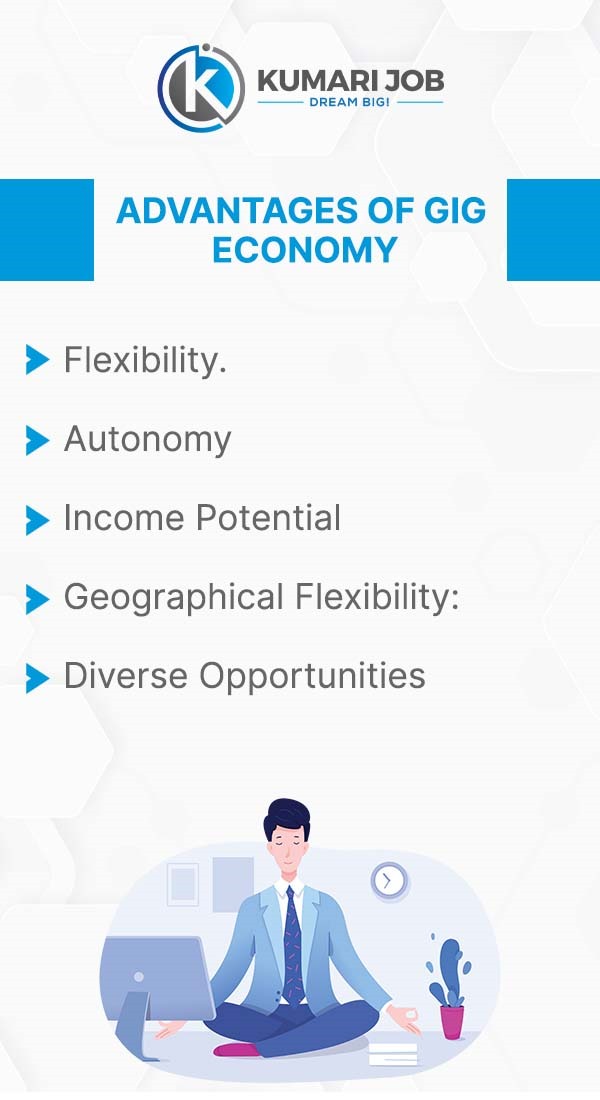What is Gig economy?
A gig economy is a free market system where businesses frequently use independent contractors for short-term projects and temporary positions are widespread. The word "gig" refers to an informal term for a temporary position. Musicians have historically used this term to describe a performance engagement.
The gig economy is a labor market characterized by short-term, temporary work arrangements and independent contracting, often facilitated through digital platforms or apps. In this economy, individuals work as freelancers or independent contractors, taking on projects or "gigs" for various clients or companies.
The gig economy offers flexibility in work schedules, autonomy in assignment selection, and technology-based matching for remote tasks like ride-sharing, food delivery, freelance writing, and graphic design.
The importance of the Gig economy
The gig economy plays a significant role in recruitment by offering both opportunities and challenges for employers and workers alike.
1. Access to a Diverse Talent Pool: The gig economy allows employers to tap into a wider and more diverse talent pool. They can recruit individuals with specific skills or expertise for short-term projects without the need for long-term employment commitments.
2. Skills On-Demand: In industries requiring specialized skills or niche expertise, the gig economy enables employers to access talent on demand. They can find and recruit freelancers or independent contractors with the precise skills required for particular projects.
3. Cost-Efficiency: Recruiting gig workers can be cost-effective for employers, as they often don't have to provide benefits or long-term commitments typically associated with full-time employees. This can lead to cost savings in areas like healthcare, retirement contributions, and overhead expenses.
4. Innovation and Agility: The gig economy fosters innovation and agility in recruitment practices. Employers can experiment with new talent-sourcing strategies, such as crowdsourcing platforms or gig-based marketplaces, to find the right candidates quickly and efficiently.
5. Career Flexibility for Workers: From the perspective of job seekers, the gig economy offers career flexibility and autonomy opportunities. Individuals can choose when, where, and how they work, allowing for better work-life balance and the pursuit of multiple interests or income streams.
6. Upskilling and Learning Opportunities: Gig workers often engage in diverse projects and assignments, providing opportunities for continuous learning and skill development. This can be attractive to individuals looking to enhance their expertise and stay competitive in the job market.
However, it's important to recognize that the gig economy also poses challenges in recruitment, such as ensuring fair treatment and protection of workers' rights, managing remote teams effectively, and maintaining company culture in a dispersed workforce. Overall, while the gig economy offers numerous benefits for recruitment, it requires careful consideration and strategic management to maximize its potential.
Advantages of working in the Gig economy
Working in the gig economy offers several advantages for individuals seeking flexibility, autonomy, and diverse opportunities:
1. Flexibility: Gig workers have the freedom to set their schedules and choose the projects or assignments that align with their preferences and availability. This flexibility allows for better work-life balance and the ability to pursue other interests or responsibilities.
2. Autonomy: Gig workers have greater control over their work environment, methods, and decision-making processes. They can work independently, without direct supervision, and have the autonomy to manage their workload and workflow according to their preferences.
3. Diverse Opportunities: The gig economy offers various opportunities across various industries and sectors. Gig workers can explore different roles, projects, and clients, allowing them to gain diverse experience, expand their skill set, and pursue their interests.
4. Income Potential: Gig workers have the potential to earn a higher income compared to traditional employment, particularly if they possess specialized skills or expertise in high-demand areas. They can negotiate rates for their services and take on multiple projects simultaneously to increase their earnings.
5. Geographical Flexibility: The gig economy enables remote work, allowing individuals to work from anywhere with an internet connection. This flexibility eliminates the need for commuting and opens up opportunities for individuals living in rural or underserved areas to access employment opportunities.
6. Entrepreneurial Opportunities: Working in the gig economy can provide individuals with a platform to launch their own businesses or entrepreneurial ventures. They can market their skills, build a client base, and establish a reputation in their respective fields, potentially leading to long-term success and growth.
7. Continuous Learning: Gig workers often engage in diverse projects and assignments, providing opportunities for continuous learning and skill development. They can acquire new skills, stay updated on industry trends, and adapt to changing market demands, enhancing their employability and career prospects.
Overall, the gig economy offers numerous advantages for individuals seeking flexibility, autonomy, and diverse opportunities in their work lives. However, it's essential for gig workers to carefully manage their finances, plan for periods of inconsistency, and prioritize self-care to thrive in this dynamic and evolving labor market.
Disadvantages of the Gig economy
Certainly, here are some disadvantages of the gig economy:
1. Income Inconsistency: Gig workers often experience irregular income, with earnings fluctuating based on the availability of projects and clients. This inconsistency can make it challenging to budget and plan for financial stability.
2. Lack of Benefits: Gig workers typically do not receive benefits such as health insurance, retirement plans, paid time off, or unemployment benefits that are commonly provided to traditional employees. This lack of benefits can leave gig workers financially vulnerable and without important protections.
3. Job Insecurity: Gig workers often lack job security, as they are not guaranteed a steady stream of work or ongoing employment. They may face periods of unemployment or underemployment, especially during economic downturns or when demand for their services decreases.
4. No Legal Protections: Gig workers are often classified as independent contractors rather than employees, which means they may not be entitled to the same legal protections and rights afforded to traditional employees. This can leave gig workers without recourse in cases of workplace discrimination, harassment, or unfair treatment.
5. Overwork and Burnout: Gig workers may feel pressure to accept as many gigs as possible to maximize their earnings, leading to overwork, exhaustion, and burnout. The lack of clear boundaries between work and personal life can contribute to stress and mental health issues.
6. Limited Career Growth: Gig work may not offer the same opportunities for career advancement or skill development as traditional employment. Gig workers may find it difficult to progress in their careers or access training and development opportunities that could help them improve their skills and expand their professional networks.
7. Isolation: Gig work is often solitary, with gig workers working remotely or independently without regular interaction with colleagues or supervisors. This isolation can lead to feelings of loneliness and disconnection from the broader workforce.
Overall, while the gig economy offers flexibility and autonomy, it also presents significant challenges related to income instability, lack of benefits and protections, job insecurity, overwork, limited career growth, isolation, and exploitative practices. Addressing these disadvantages requires policymakers, employers, and gig platforms to prioritize the well-being and rights of gig workers while promoting fair and equitable employment practices.
Impact on Recruitment
The rise of the gig economy has influenced both businesses and job seekers, causing many changes in the recruitment process:
1. Changing Talent Pool: The gig economy has broadened the available talent pool because people worldwide can now offer their skills globally. This means that businesses will have access to a broader range of skills and knowledge.
2. Changing Recruitment Strategies: In the gig economy, traditional recruitment approaches may not be as effective. Companies must alter their strategy to recruit gig employees such as highlighting their flexibility and intriguing opportunities.
3. Talents vs. Degrees: In the freelance economy, talents and experience sometimes trump formal education. Businesses increasingly value a candidate's portfolio and former projects over their academic credentials.
4. Employer Branding: A strong employer brand is essential because gig employees can choose their projects. Positive feedback from previous gig workers can help to attract more top talent to work on specific projects.
5. On-Demand Hiring: The gig economy allows firms to hire talent as needed. Companies can swiftly recruit gig workers to execute specific tasks instead of hiring full-time employees for short-term projects.
3 Types of Gig Economy Workers
Gig economy workers can be broken down into three sub-categories:
Full-time Independent
Anyone working 15 hours or more from home and getting paid for it is typically on their way to full-time independent employment. These contractors do not plan on altering their situation in the foreseeable future and are likely to have retirement plans.
Part-time Independent
These are contractors who regularly work a few hours a week on a part-time basis. They treat the gig as supplemental income. Many of these people are trying to break out of minimum wage, move away from traditional jobs, or start new careers.
Occasional Independent
Those who do independent or on-demand work sporadically, but at least once a month. One common trait is the knowledge that work is short-term. Generally, if a company wants a freelancer to be there indefinitely, they will hire them permanently.
Frequently Asked Questions
The gig economy generally refers to services provided through short-term contracts, freelance work, or other temporary work that is arranged through an online platform or mobile application.
There are many benefits to finding work in the Gig Economy, including greater control of your own schedule and the ability to set your own work rates. However, the downside to working for an employer that pays in gig hours is poor compensation.
The gig economy, often called the freelance or on-demand economy, has shifted the labor market towards short-term contracts, freelance work, and temporary positions. This transformation has redefined how recruiters search for and hire top talent, offering new opportunities for flexible, skilled workers.
In Nepal, gig work is mainly concentrated in the service sector, especially in areas like transportation and delivery. Similarly, the growth of e-commerce and online delivery services has also led to an increase in the number of people working as delivery drivers or couriers.
The term "gig economy" means a general workforce environment, which includes short-term employment, contractual jobs, and independent contractors. It is also called "freelancer economy", "agile workforce", "sharing economy", or "independent workforce"
Conclusion
The gig economy offers flexibility, autonomy, and diverse opportunities for entrepreneurship and remote work. However, issues like income instability, lack of benefits, and job insecurity need better protections and support systems. Policymakers, employers, and gig platforms must prioritize worker well-being and rights while fostering an environment of fairness, inclusivity, and sustainability. By addressing these challenges, the gig economy can create a more dynamic and equitable labor market for everyone involved, leveraging the potential of the gig economy.




